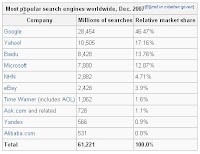That Special Search
A not-for-profit whose newsletter I subscribe to sent me this notice recently: "Log on to www.GoodSearch.com, type in the name of this not-for-profit, click verify, and start searching. We will get a penny per search."
That sounded like a reasonable enough idea, so I checked out the site. I entered my charity, and searched on "search engine." For comparison's sake, I entered the same search string into Google.
Google's results led with Dogpile (an alternate search engine), followed by several pages discussing search engines (including the ubiquitous Wikiepedia). (I have concluded that it's not Google who aims to take over the Universe, but Wikipedia... but that's another topic.)
GoodSearch's results were in a way, more interesting: buried amid the paid results were several pages of, well - links to search engines! Which is actually what I was looking for.
As it often happens with these things, I then got intrigued by what other alternative search engines are out there these days. A few weeks back we talked about Ask.com, a human-powered search engine that takes us back to the days when spiders searched, and human beings indexed and sorted. Now I wanted to know what other choices there were.
A quick glance at Wikipedia lets us know which engines (as of December, 2007) are the most popular:

One of the more fascinating sites is something called Search Engine Colossus.
Here you can find search engines specific to most of the world's nations - click on "France," for example, and you will see a variety of search engines for French-speakers.

You can also use the site to look for search engines that specialize in subject matter or format: video, for example, or search engines that specialize in topics of interest to women.
The aforementioned Dogpile
operates on the premise that not all search engines return the same results, so it performs what is called "metasearches," using several search engines (in this case, Google, Yahoo, Live Search, and Ask) to search on the same query, then packaging and returning the results to you.

And I was able to turn up search engines that specialized in art, how-to instructions, religions, and automobiles.
And don't forget, if you're a Firefox user, you can use specialty search engines already on your toolbar (go to the upper right hand corner - you'll see the Google G, with a small downward pointing arrow next to it. Click on it, and you can search Amazon, Answers, Yahoo, and others already available, or select "Manage Search Engines" to add others of your choosing!
Yeah, Google is great - but why stop there? And as more and more information is added to the Internet, the idea of specialized search engines makes more and more sense.
That sounded like a reasonable enough idea, so I checked out the site. I entered my charity, and searched on "search engine." For comparison's sake, I entered the same search string into Google.
Google's results led with Dogpile (an alternate search engine), followed by several pages discussing search engines (including the ubiquitous Wikiepedia). (I have concluded that it's not Google who aims to take over the Universe, but Wikipedia... but that's another topic.)
GoodSearch's results were in a way, more interesting: buried amid the paid results were several pages of, well - links to search engines! Which is actually what I was looking for.
As it often happens with these things, I then got intrigued by what other alternative search engines are out there these days. A few weeks back we talked about Ask.com, a human-powered search engine that takes us back to the days when spiders searched, and human beings indexed and sorted. Now I wanted to know what other choices there were.
A quick glance at Wikipedia lets us know which engines (as of December, 2007) are the most popular:

One of the more fascinating sites is something called Search Engine Colossus.
Here you can find search engines specific to most of the world's nations - click on "France," for example, and you will see a variety of search engines for French-speakers.

You can also use the site to look for search engines that specialize in subject matter or format: video, for example, or search engines that specialize in topics of interest to women.
The aforementioned Dogpile
operates on the premise that not all search engines return the same results, so it performs what is called "metasearches," using several search engines (in this case, Google, Yahoo, Live Search, and Ask) to search on the same query, then packaging and returning the results to you.

And I was able to turn up search engines that specialized in art, how-to instructions, religions, and automobiles.
And don't forget, if you're a Firefox user, you can use specialty search engines already on your toolbar (go to the upper right hand corner - you'll see the Google G, with a small downward pointing arrow next to it. Click on it, and you can search Amazon, Answers, Yahoo, and others already available, or select "Manage Search Engines" to add others of your choosing!
Yeah, Google is great - but why stop there? And as more and more information is added to the Internet, the idea of specialized search engines makes more and more sense.
Comments